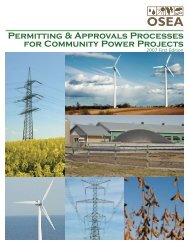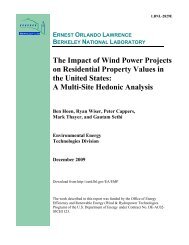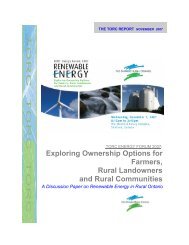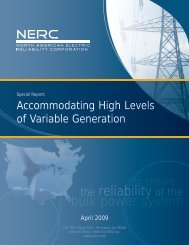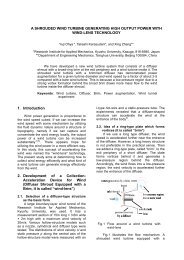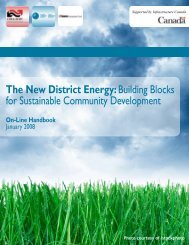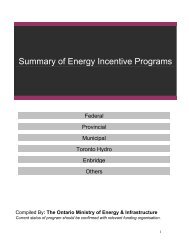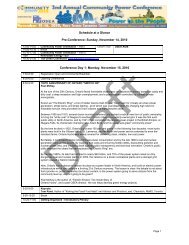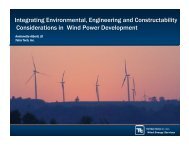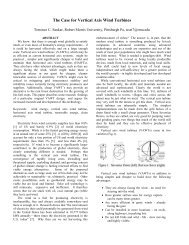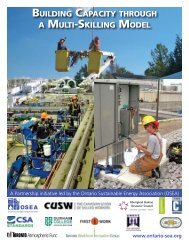Haubenschild Farms Final Report - The Minnesota Project
Haubenschild Farms Final Report - The Minnesota Project
Haubenschild Farms Final Report - The Minnesota Project
You also want an ePaper? Increase the reach of your titles
YUMPU automatically turns print PDFs into web optimized ePapers that Google loves.
<strong>The</strong> <strong>Minnesota</strong> <strong>Project</strong> August 2002<br />
Policy<br />
Since the <strong>Haubenschild</strong> digester was built, <strong>Minnesota</strong> leaders have implemented several<br />
initiatives to encourage digesters, many of which were policy recommendations in the<br />
original <strong>Haubenschild</strong> report:<br />
! A state production payment of 1.5 cents per kilowatt-hour was extended to include<br />
on-farm digesters;<br />
! <strong>The</strong> <strong>Minnesota</strong> Department of Agriculture’s zero interest loan program for<br />
digesters was expanded;<br />
! <strong>The</strong> <strong>Minnesota</strong> Department of Commerce released a report in August 2002 that<br />
considers the total potential for biogas production on <strong>Minnesota</strong> farms;<br />
! <strong>The</strong> <strong>Minnesota</strong> Pollution Control Agency has considered anaerobic digesters as a<br />
mitigating technology when negotiating with feedlot operators;<br />
! Great River Energy, the electric generation and distribution cooperative utility for a<br />
majority of farms in <strong>Minnesota</strong>, has recently announced a special grant program for<br />
digesters; and<br />
! East Central Energy, <strong>Haubenschild</strong>’s utility, has instituted the first green electricity<br />
marketing program in the country exclusively for digester-produced power, by<br />
offering their customers the option to purchase “cow power”.<br />
Policies to encourage digesters are rolling along, not only in <strong>Minnesota</strong> and other states, but<br />
at the federal level as well. <strong>The</strong> near future may see a rapid expansion in the number of<br />
digesters on farms, without the need for additional incentives.<br />
Digester policy and equity<br />
<strong>The</strong> capital-intensive nature of digester systems, as well as economies of scale in their<br />
construction and operation, are major barriers to their development on smaller and midsized<br />
farms. <strong>The</strong> way policies are currently structured, this means that tax dollars to<br />
encourage the construction of digesters will tend to go towards larger farms. Unless there<br />
is a way to balance this out, smaller operations will be at a competitive disadvantage, since<br />
they don’t have as easy access to these funding sources as larger operations do. Future<br />
policies should consider this equity question.<br />
30




